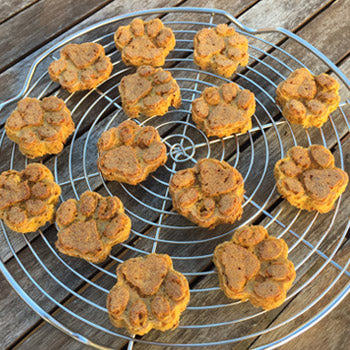Pumpkin Dog Cookies
 It's Halloween and you'll be seeing pumpkins everywhere!
To celebrate, we propose some homemade cookies with a lot of love for your furry friend.
At CRU we believe that the best diet for our dogs and cats is the BARF diet or raw feeding, excluding cereals from the daily diet. Still, a day is a day and nothing happens if you give your four-legged friend some oatmeal.
It's Halloween and you'll be seeing pumpkins everywhere!
To celebrate, we propose some homemade cookies with a lot of love for your furry friend.
At CRU we believe that the best diet for our dogs and cats is the BARF diet or raw feeding, excluding cereals from the daily diet. Still, a day is a day and nothing happens if you give your four-legged friend some oatmeal.
Halloween Dog Cookies
(for 30 chubby cookies in our molds, you can reduce the quantity by half to make less)Ingredients
- 2 eggs M/L
- 250 g pumpkin puree
- 350 g ORGANIC whole oats
- 1 tablespoon unsweetened peanut butter
Preparation
- Crush the oat flakes. There doesn't have to be any fine flour left, it is good if there are some whole flakes left.
- Cook the pumpkin. We have made it in the microwave but you can make it in the oven or cook it in a pot, in the latter case you must drain it very well to avoid excess water. Blend, pass through a food processor or mash with a fork so that it becomes a puree.

3. Mix the pumpkin puree with the eggs.
We have a small mixer but it can be done perfectly with a spatula, pastry tongue or with your own hands.4. Preheat the oven to 180º.
5. Add the oat flour little by little and the peanut butter until you have a homogeneous dough.

6. Fill the molds; If you don't have cookie cutters, you can stretch the dough between two sheets of baking paper and cut it into the shape you prefer.
7. Bake at 180º for about 15-20 minutes.
8. Let them rest on a rack and cool completely before giving them to your furry friend!

 Do you want to keep them? Once cooled, the best way to preserve it will be in a tin or glass jar. You can also put them in a zip bag and store in the refrigerator.
These cookies are also perfect for cats, although we cannot guarantee success with them as their tastes may be more special.
*This article has been written based on our knowledge and unconditional love for dogs and cats, but at no time does it replace the advice of a veterinarian. The CRU will be happy to try to resolve any questions you may have, but if your pet suffers from any pathology, we recommend that you consult with a registered veterinarian.
Share:
Do you want to keep them? Once cooled, the best way to preserve it will be in a tin or glass jar. You can also put them in a zip bag and store in the refrigerator.
These cookies are also perfect for cats, although we cannot guarantee success with them as their tastes may be more special.
*This article has been written based on our knowledge and unconditional love for dogs and cats, but at no time does it replace the advice of a veterinarian. The CRU will be happy to try to resolve any questions you may have, but if your pet suffers from any pathology, we recommend that you consult with a registered veterinarian.
Share:







